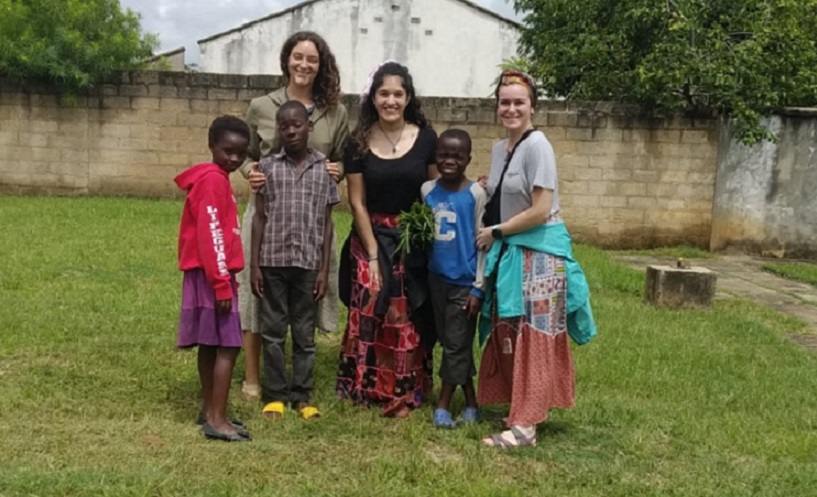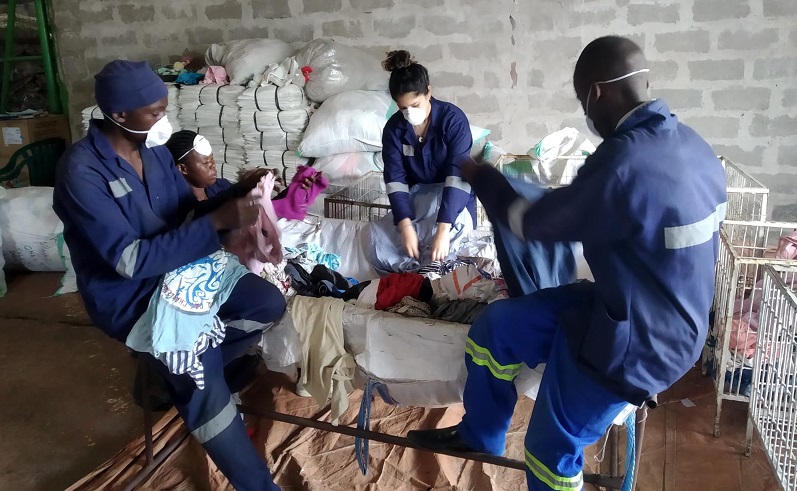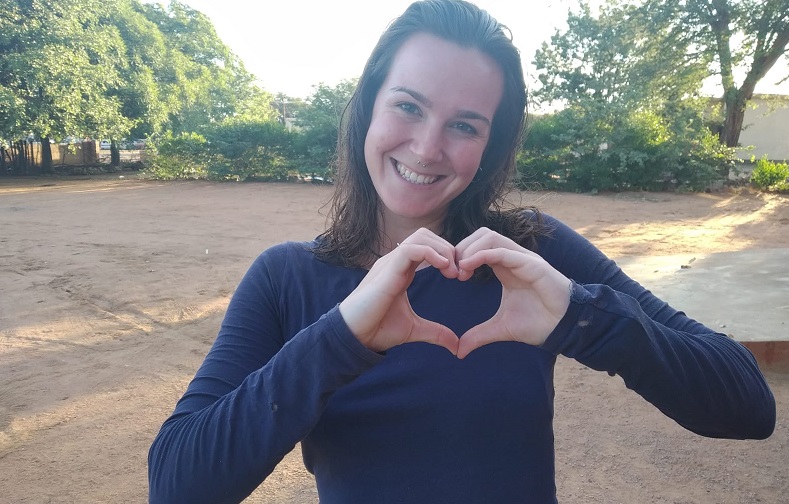You can take a girl from Africa - but you cannot take Africa from a girl!
Once upon a time in February 2020, two Development Instructors called Carla and Agustina went to Zambia for their project period. But their stay in Zambia became very short, only two weeks. Because of political and social problems, Humana People to People decided they needed to relocate to a project in Botswana. Their time in Botswana was also cut short, this time because of Covid19....
But as you can see below they experienced a lot and also made themselves useful! Hope you enjoy their story full of life and experiences.
By Carla Barrado and Agustina Bastías Solis, Poverty Activist team November 2019
Two short but eventful weeks in Zambia
After two days of travel, we arrived at Ndola airport on February 24, 2020.
We didn’t know whether to cry, laugh, run down and lose control or stay there and return to another country. So we opted for the first option, looked for the other's gaze and the marvels of wonder. We were finally in Zambia.
The surprise had already started here. The truth is that we still didn’t know what Africa had in store for us; we would not only be in Zambia, but also enjoy a short stayed in Botswana.
The work in the field was mainly in Zambia and we divided it into three fundamental experiences that we will detail.
1. Get into the culture
From the moment we decided to face the challenge of traveling to Zambia, we were amazed at the idea of integrating into a culture different from ours. That is why, during our period in the country, we decided to participate in activities outside the workplace that would allow us to learn from within the values and principles that govern culture, looking through Zambian glasses. In principle, with the aim of connecting with the population with which we would potentially work and, secondly, to marvel at a different way than we have to appreciate the world.
For this, we got lost in the streets of Ndola to visit vegetable and clothing markets, as well as local food stores. Travelling by buses made for 12 people, enjoying the company of 20 or by car with 7 people. We learned how important it is to wear a chitenge while doing the activities of daily life, to don’t get your clothes dirty and, of course, to look prettier.
We delighted in eating nshima with the many accompaniments it can have, taking advantage of the last portion that remains on our fingers. We attended church at 8 in the morning on a Sunday, to accept the enthusiastic invitation of our neighbour, so we had to find our most elegant skirt, in our case. We take advantage of break times at work to learn about the lives of workers and that they also know about ours; we talk about work, languages and, most of the time, about love and relationships. We survived the mosquitoes thanks to the special net made for it, despite how uncomfortable it was and how funny we looked. And finally, but most importantly, we opened our doors to neighbours, being visited daily by girls, boys and adolescents with whom we shared delicious meals, movies and games.
Each of these activities allowed us to get to know life inside and outside the Zambian home, and mainly, made us feel at home.
2. Work in the Field
While waiting for the date of the trip, we decided not to stop and be useful. For this reason, we developed a work plan together with Mr. Mubita, approved by Lawrence (our Project Leader). So, for a week we were helping to develop the following activities:
Clothes and Shoes Donations Project:
CICD (College for International Co-operation and Development) is a school dedicated to collecting clothing and shoes, that is sold by other companies in second-hand stores in Europe, and later, this clothing that is not sold there is sent to countries of Africa.
That said, we were able to verify the accuracy of this statement. It was a large warehouse divided into two parts.
The first part is where the clothing capsacks come straight from Europe and are ready to be shipped to Zambia's stores. There is a group of fourteen men working with their own body strength and they are very organised. They unload and load the trucks, make inventory and organise everything within that large part of the warehouse.
Clothes that are shipped to stores go through a two-week process. Once this period ends, the clothes are returned to the same warehouse and accumulated in the second part of this warehouse.
In the second part, there is a group of four people working (sorters), and they are in charge of checking what the stores have sent and they divide it into: 1. Better quality clothing (it is intended for DAPP Zambia volunteers), 2. Low-quality clothing (it is intended for people who live in the communities and are responsible for re-using it or converting it into sheets, cushions, doormats, etc.), 3. Pieces of cloth and others, such as stained or large; and 4. Baby clothes (for communities too). They are very organised too and these people are in charge of keeping everything clean and tidy.
Kaloko’s Women Saving Group.
We visited a community in Kaloko in which there is a group of women who are empowered especially in the economic sphere. To make this possible, the group is in charge of putting a little money to support it and to start developing activities and tasks. A workshop that we made to the community was to use the clothes they receive from the donation project and make a purse (either for themselves or for later sale). The materials were: fabric from an old T-shirt, belt, buttons, thread and needle.
Kaloko’s School.
We returned to this community since we were invited to meet the school group. We went twice.
For the first time we prepared a series of games for about sixty boys and girls:
1. Presentation: in a large circle, each person said their name and made a movement, sound or shape with the body and the others imitated it.
2. Multiple tasks: Put on a T-shirt, walk with a spoon and a stone in your mouth, go under a chair and jump into a bag until you reach a stuffed animal.
3. Three foot race.
4. Stretching.
5. And then we sang and played together. The activity was proposed by the three school teachers.
And for the second time we went, we prepared at home a typical Chilean food (sopaipillas) for all the students. We basically went to say goodbye and the surprise was for us; they had prepared some songs for us.
Overspill’s Women Saving Club, ‘Uwa kwensha ubu shiku bamutasha elyo bwacha’.
In this group we carried out the same activity of making purses using pieces of clothing and accessories, and many of them were encouraged, despite the fact that the women were already sewing to later sell those products (sheets, cushions and doormats).
And to close this experience, we want to express the love and affection that each person that we come across in these activities gave us. We were received by the women singing and dancing, even on some occasions they offered us refreshments and cookies, the oldest of the school prepared some singing performance, they dedicated songs to us wherever we went, the boys and girls laughed innocently, and we took many photos and let us know that they loved our presence. It was very emotional, beautiful and that made us part of them
3. In the community - what does it mean to be a volunteer?
We wanted to allocate a special section for this experience, which converges from the previous sections and refers to the bonding style that we, as volunteers, build with the community and that, to some extent, comes premeditated from the relationships that previous volunteers have developed with the people.
In this sense, it seems necessary to us to raise this issue in order to generate a debate regarding the practices that, as volunteers, we have when it comes to relating to the community with which we interact either to work or to live. And perhaps to question ourselves and the idea we have about "being a volunteer" or living with people "less privileged than us".
First of all, we seem to carry a stereotype of “hero” that we win because of our skin colour and our foreign origin. With this, we refer to the construction that has been done by local people and fed by foreigners, about the purpose of our stay, which is perceived as a sample of actions that should be imitated only because we say that they should be done, without questioning motives or consequences. We perceive this sometimes when we visit the communities and the workers stop their work to give us spaces to carry out our activities, or when we walk down the street and people ask us to please help them by giving them money.
Secondly, this “hero” image is encouraged by the desire of local people to look like us, not as individuals, but because of where we come from and the perception of privileges that we have because of the colour of our skin. Which, from some logic, can obey the collective memory of the Afro-descendant people related to the slave trade and the pain that this generates in the people. We perceived this when one of the girls who visited us confessed that she dreamed of having our skin colour, so that she would feel more beautiful and a better person.
Also when we met Kennedy, a guy over 20 years old who very enthusiastically approached us on the street to give us his phone number and tell us that he also travelled a lot, that in fact his passport was going to expire soon, promoting himself to be our friend because he was different from those of his country and more similar to us.
Finally, what has triggered this set of reflections, were the farewells that we had with our neighbours, who demanded that we leave them some technological garment or device as a farewell gift so that they would remember us. Also, we noticed that some of them only visited us when they supposed we would have food to share, denying other children to go to our house because only they could be our friends.
These situations, along with others, led our reflections around the image that society has of a “volunteer” or, rather, the stereotype that has been built by the people of Zambia regarding the practices that we carry out according to the self-concept that we have.
With this, we consider and invite future volunteers to rethink: what is being a volunteer? Do we facilitate or assist? Do we support or help? This with the purpose of questioning our position as formerly privileged a society that seems to have less, but surprisingly seems to give more to the volunteers than they leave behind.
4. Challenges
- Language: In Zambia there are seventy-three official languages, one of them being the English that is learned in school and therefore it is only possible to communicate well with the older boys and girls (and even so, because of the accent they have we sometimes did not understand anything). The language per excellence spoken in the area where we were, was Bemba.
In order to feel part of and show affection and respect to people, we learned to greet and say some basic things in this language, but it was not enough to explain or talk about some topics. Therefore, the importance of a translator at our side was vital and very collaborative. After all, the important fact was not necessary to speak the same language for express our affections or desires, was enough talk with gestures and signs.
- Time: Since we had a departure date, we decided to make the most of Zambia. It was not six months, it was reduced to just two weeks, but even so we didn’t want to miss the opportunity to be in that place and to be able to carry out some activity with the local people (since for many months we had been waiting to come to Zambia, of which six months we already had in mind that we would come to this place and we already planned our workshop proposals). So we played at home with the neighbours, we did sewing activities, we learned how to make bracelets, we cooked together, we made purses in the communities, we prepared sports activities with the children, we helped to select clothes and clean, etc. It was short but very intense and we felt that we made the most of the time and that it served them a lot, but without a doubt, it filled us much more.
- Culture: Among some other aspects, what caught our attention the most was the time they take to do things. We already checked it the first days when we saw that to take a photo we used a whole day or to deliver the papers for the Visa it was necessary for the whole morning or another day. We thought it was funny and at times we got a bit desperate, but as Blessings explained to us while we ate: "things are done slowly, yes, and it is the best way to enjoy them."
Finally, we were left with the feeling of having used the time well despite the contingencies. Honestly, we would have loved to stay the six months that were scheduled in Africa, however, the time was enough to get friendships and to have a general idea of the culture, people and lifestyle of two countries that welcomed us as if we were their daughters.
Now what we heard from a teacher when we started our training at CICD makes sense to us: "You can take a girl from Africa, but you cannot take Africa from a girl."








